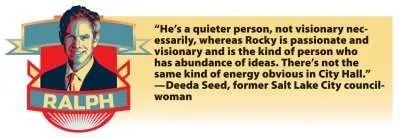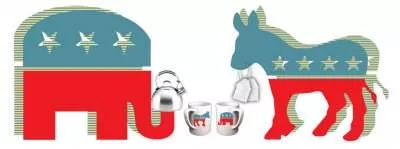
There’s an old joke circulating around Salt Lake City at the mayor’s expense.
An architect, an engineer and a planner all die and go to heaven. God asks the architect what he did with his life to make the world better. The architect responds that the arts and design make for a better life.
God then asks the engineer, who says good engineering helps people work more productively and have greater wealth. Finally, God turns to the planner, who says, “Well, the first thing I think is that you’re sitting in my chair.”
There is something of that chutzpah in Ralph Becker, the first-term mayor of Salt Lake City who’s about to coast into a second, largely uncontested. While a 79-year-old Republican, J. Allen Kimball, is challenging him, it’s a token challenge, at best. In fact, the last time a Republican won the Salt Lake mayoral seat was 40 years ago, when Jake Garn was elected.
That, and the fact that the city mayoral race is an inordinately costly venture, may dissuade challengers. Although Salt Lake City’s population is only 186,000, both former Mayor Rocky Anderson and Becker used television and radio spots to spread their messages as far as Idaho and Wyoming. Both men quit their jobs and basically spent a full year walking neighborhoods and campaigning for mayor, spending upwards of $1 million for the shot. Not everyone can afford to do that.

Becker is, for all intents and purposes, the opposite of his predecessor Anderson. He’s low-key, quiet—almost boring, compared to Anderson’s fiery passion and polarizing style. He’s something of a wonk, in fact. When he first ran for office, he did so as “Blueprint Man,” the candidate with the plans, even if not the vision.
“Ralph doesn’t do things in a forceful way; he does them on merit instead of politics,” says Tim Chambless, associate professor in the political-science department at the University of Utah. “His constituency is the same that supported Rocky Anderson. On substance, he and Rocky are about 95 percent the same; on style, he is considerably different.”
This speaks more to the demographics of Salt Lake City than the popularity of the two mayors. Salt Lake City voters simply expect a Democrat in office, despite the nonpartisan nature of the election.
“The thing I learned is that many voters look to the mayor as a partisan office,” says Dave Buhler, a former state senator and city councilman who twice ran in the primary, only to be trounced in the general election.
“Ralph is not a high-risk choice,” says Buhler. “Nobody doesn’t like him.”
And that may be Becker’s recipe for success. Certainly, an opponent needs to be able to make a case against the incumbent, but Becker’s under-the-radar style makes that difficult.
“He’s a caretaker mayor,” says former city councilwoman Deeda Seed. “My sense is that people don’t have strong opinions about Ralph.”
That’s not to say there haven’t been controversies in Becker’s first term, including what’s now referred to as the “big-ass theater” proposed for downtown. He stirred up environmentalists with a proposal to develop near wetlands in the city’s Northwest Quadrant beyond the airport. The popular after-school program, Youth City, was cut to bare bones; the initial plan to locate the public-safety complex on library square didn’t go well; and pretty much the entire dog-loving community in Salt Lake City felt betrayed by Becker.
“Becker screwed dog owners who care about open space for dogs by reversing the 2007 city-council decision to make Parley’s Nature Park an off-leash park,” says dog owner Jim Breitinger. Anderson had agreed to a create a formal management plan for dogs off-leash, but Becker created one with the help of a pricey outside consultant and “imposed new rules and restrictions that go against the spirit of the 2007 council vote,” says Breitinger, who thinks it’s inexplicable that Becker won’t work with what he considers a responsible group of citizens.
Jack Arnott, of Millcreek Friends Interested in Dogs and Outdoor Spaces (FIDOS), says that besides a recent candidate forum, Becker has refused to meet with the group. “There has to be huge uprising to get his attention, and then he doesn’t seem to care about input of other people,” says Arnott. “He’s a very good figurehead, but not a good leader.”

Arnott thinks the mayor simply isn’t interested in solving the social issues surrounding an ecological problem. It may not be that so much as that Becker is simply drama averse. “He doesn’t like the give-and-take of debate,” says former Salt Lake County Councilman Joe Hatch. “He does not participate in the free flow of ideas if people disagree with him.”
Chambless says Becker plans before he acts—he’s quiet and decisive.
“When you think about it, he’s a conciliator, a facilitator who’s concerned with problem-solving, thinks critically and brings people together,” says Chambless.
Even Buhler thought Becker would have more formal opposition from dog-walking groups and from the left in general as this year’s election approached, but none of it bubbled to the top. “He’s done a good job in very tough economic times by adding fees but not a general tax increase,” Buhler says.
Seed actually likens Becker to President Barack Obama, in that his liberal base is hungry for action and a little befuddled by his lackadaisical style. The two are intellectual, scholarly, but not overtly passionate. “A lot of progressives are looking at Obama and pining for leadership from him,” she says. “It reminds me of Ralph.
“He’s a quieter person, not visionary necessarily, whereas Rocky is passionate and visionary and is the kind of person who has abundance of ideas,” she says. “There’s not the same kind of energy obvious in City Hall.”
But Becker does have a portfolio of environmental accomplishments to point to from his first term. Although the omnipresent bike lanes created some angst, they were embraced by the community for the most part. He also has expanded the city’s recycling program and helped get federal dollars for a proposed Sugar House streetcar line. Sustainability and protecting the environment are major goals of his, and he’s worked toward those ends.
Hatch believes that most resistance to Becker is really insider nitpicking, since Becker holds onto an 84 percent public-approval rating. The mayor gets along well with the city council—perhaps too well for meaningful dialogue, Hatch says.
So, absent any major missteps, Becker’s path to city hall is virtually clear. If Salt Lakers are looking for a different, more visionary and fiery form of leadership from their mayor, Seed says, “Unless it’s Rocky running against Ralph, there just isn’t anybody out there.”%uFFFD
More on Election 2011:

